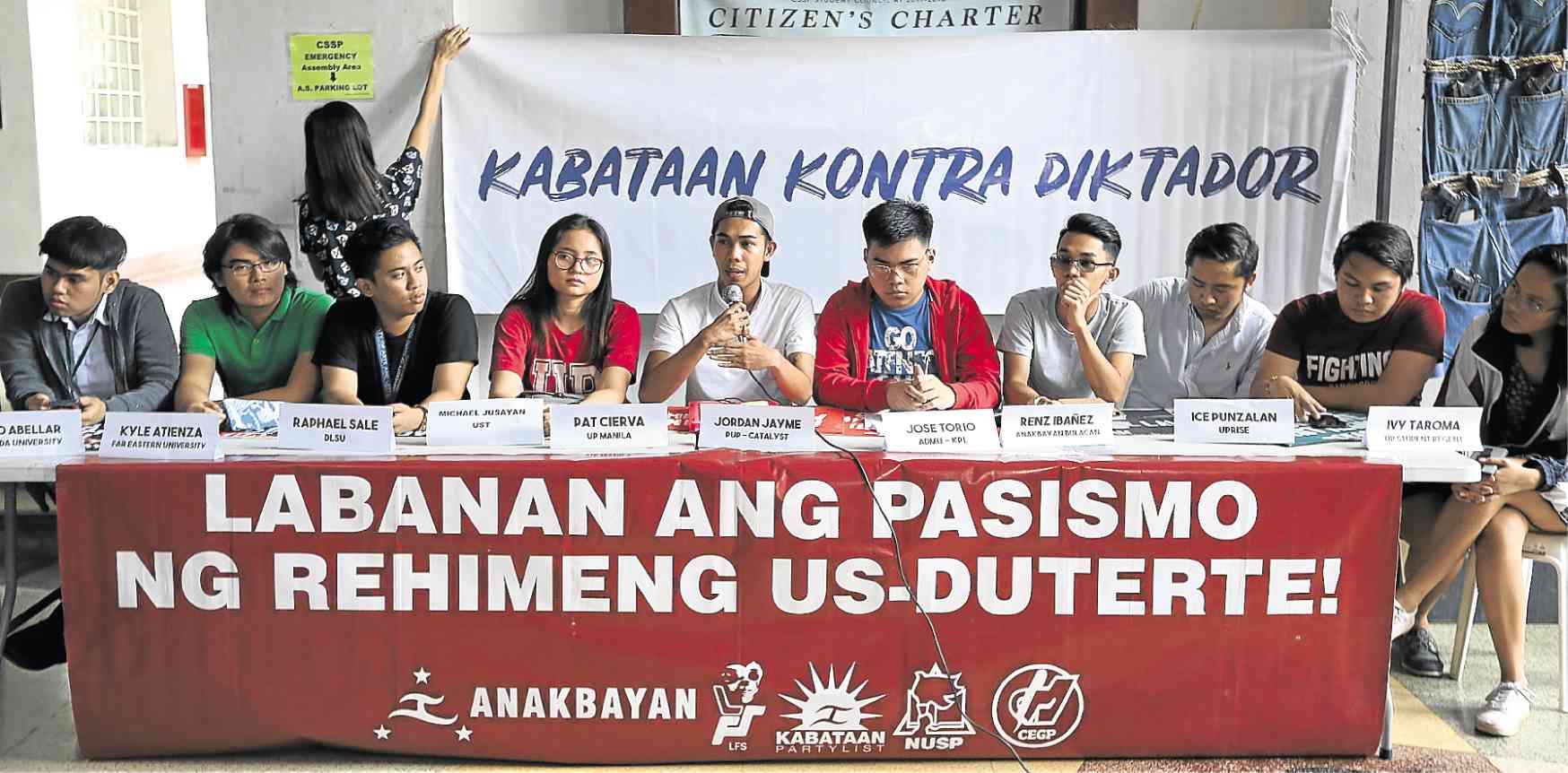
STUDENTS’ PROTEST Student leaders from several schools in Metro Manila, which have been named by the military as targets of communist infiltration as part of a “Red October” plot to oust President Duterte, gather at the University of the Philippines Diliman on Thursday to denounce the “highly sensationalized and largely unfounded” allegation. —NIÑO JESUS ORBETA
Armed Forces Chief of Staff Gen. Carlito Galvez Jr. on Thursday said the military was open to dialogues with administrators and student councils of 18 Metro Manila schools earlier identified by one of his deputies as recruitment hubs for communist rebels for a plot to oust President Duterte.
In an interview with radio station dzMM, Galvez clarified that the Armed Forces of the Philippines was “still validating” whether the Communist Party of the Philippines (CPP) and its armed wing, the New People’s Army (NPA), were indeed recruiting in all the schools that Brig. Gen. Antonio Parlade, assistant deputy chief of staff for operations, identified on Wednesday.
The Commission on Human Rights (CHR) scored the military for the “Red tagging” of the schools based on “unverified” information and warned that this could lead to repression of student activism.
“This blanket act of Red tagging endangers students and the youth and it may give the AFP a license to arbitrarily infringe the freedom of expression, the right to petition government, as well as to assembly,” said CHR spokesperson Jacqueline de Guia.
In a press briefing on the Diliman campus of the University of the Philippines, one of the schools on the AFP list, student leaders pushed back against the military allegations that they would be used for the communist-led “Red October” plot.
They said the listing—along with the recent bomb scares in several schools in Metro Manila, Bulacan and Iloilo provinces—could be used to justify the declaration of martial law outside of Mindanao, where it had already been imposed.
Crackdown fears
Malacañang tried to ease fears of a crackdown on the schools.
“There was no order to curtail academic freedom, there was no order to curtail freedom of expression,” said presidential spokesperson Harry Roque.
Galvez said the list of schools was among documents recovered in military counterinsurgency operations and pertained to a part of the communist party constitution, which stated the rebels’ intention to “create a broad coalition consisting of students and youth, labor and indigenous people.”
According to Galvez, the broad coalition would be concentrated in Metro Manila “so they could have critical mass in preparation for this October, November, culminating to (the CPP’s) 50th anniversary” in December.
He gave assurance that the military would closely coordinate with the Department of Education and the Commission on Higher Education in holding dialogues with the school authorities.
In a press briefing, Philippine National Police Director General Oscar Albayalde said he had directed the National Capital Region Police Office chief to talk with the concerned school officials “so we can find out how we can help.”
School activism
In a separate statement on Thursday, AFP spokesperson Brig. Gen. Edgard Arevalo said students were being drawn toward activism in “arouse-organize-mobilize” schemes and eventually recruited as “regular NPA cadres and leaders to fill up the dwindling number of political cadres.”
He said some parents were concerned about alleged “brainwashing” in schools, particularly martial law film showings and reenactments as well as video teleconferences with CPP founding chair Jose Maria Sison.
It is the students that are being targeted by the military, retorted Ateneo de Manila University (ADMU) student Jose Torio, who is also a member of the Katipunan chapter of Kabataan Partylist.
“We are being targeted in our own universities by being given starring roles in the Red October fiction that this administration is touting,” Torio said.
Films about atrocities
Michael Jusayan of the University of Santo Tomas (UST) chapter of the League of Filipino Students, said films about the atrocities under dictator Ferdinand Marcos were being shown during commemorations of this dark episode in the country’s history.
In a statement, the UST Central Student Council slammed the military allegations as “outrageous, inappropriate and questionable.”
De Guia said the martial law film screening should not be labeled subversive, “especially because it is part of our nation’s history and an established fact, the teaching of which is required by various laws and therefore not illegal.”
Roque tried to ease apprehensions, saying the President himself “has not only practiced ultimate tolerance on freedom of expression but has also practiced maximum tolerance on peaceful assemblies for redress of grievances.” —WITH REPORTS FROM MELVIN GASCON, JULIE M. AURELIO, JHESSET O. ENANO AND CEDRIX PEREZ